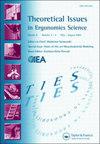Identifying and remedying failures of hazard anticipation in novice drivers
IF 1.4
Q4 ERGONOMICS
引用次数: 5
Abstract
Abstract The current paper proposes a novel taxonomy of latent hazard anticipation by distinguishing modal, strategic, tactical, and operational hazard anticipation skills. Novice drivers face an increased risk of being involved in fatal motor vehicle crashes. Research involving both on-road and driving simulator studies suggests that novice drivers are especially poor at anticipating latent hazards. We reviewed and synthesized previous works on hazard anticipation in young drivers. Modal hazard anticipation skills are broader in nature and more applicable to the general traffic, roadway, and environmental conditions, while strategic, tactical, and operational hazard anticipation skills are more scenario-specific and necessary when navigating a potentially safety-critical situation. It is known that error-based feedback training programs can improve both tactical and strategic, but not yet operational and modal hazard anticipation abilities of novice drivers. Future research should explore individual differences in the effectiveness of training interventions for young novice drivers.识别和纠正新手司机在危险预测方面的失误
摘要本文通过区分模式、战略、战术和作战危险预测技能,提出了一种新的潜在危险预测分类法。新手司机面临着更大的发生致命车祸的风险。涉及道路和驾驶模拟器研究的研究表明,新手司机尤其不善于预测潜在的危险。我们回顾并综合了以前关于年轻驾驶员危险预测的工作。模态危险预测技能本质上更广泛,更适用于一般的交通、道路和环境条件,而战略、战术和操作危险预测技能在应对潜在的安全关键情况时更具场景特定性和必要性。众所周知,基于错误的反馈培训计划可以提高新手驾驶员的战术和战略能力,但尚未提高操作和模态危险预测能力。未来的研究应该探索年轻新手司机培训干预措施有效性的个体差异。
本文章由计算机程序翻译,如有差异,请以英文原文为准。
求助全文
约1分钟内获得全文
求助全文

 求助内容:
求助内容: 应助结果提醒方式:
应助结果提醒方式:


